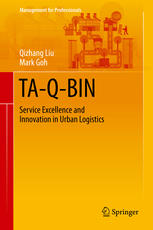

Most ebook files are in PDF format, so you can easily read them using various software such as Foxit Reader or directly on the Google Chrome browser.
Some ebook files are released by publishers in other formats such as .awz, .mobi, .epub, .fb2, etc. You may need to install specific software to read these formats on mobile/PC, such as Calibre.
Please read the tutorial at this link: https://ebookbell.com/faq
We offer FREE conversion to the popular formats you request; however, this may take some time. Therefore, right after payment, please email us, and we will try to provide the service as quickly as possible.
For some exceptional file formats or broken links (if any), please refrain from opening any disputes. Instead, email us first, and we will try to assist within a maximum of 6 hours.
EbookBell Team

5.0
108 reviewsThis book reveals the secrets of Yamato Transport’s success in maintaining and extending its leadership in Japan’s domestic parcel delivery market. It presents six cases that illustrate how Yamato's flagship service, TA-Q-BIN, has evolved since the 1970s to the benefit of consumers, particularly urban dwellers, and how TA-Q-BIN has become an integral part of Japanese daily life. Each of the six unique cases serves as an independent teaching case for undergraduate and graduate students, describing the particular service design, operations management, innovation, supplier management, and social responsibility within the context of an Asian last-mile logistics service provider. The book also includes insightful presentations of the challenges facing supply chain and logistics service providers in Asia, and their innovative responses to these challenges using real-world cases. Besides featuring interviews with Yamato’s key stakeholders and their strategic clients, Japan-based and other Asia-Pacific Yamato operational centers make up the field method included in this book, while secondary data is drawn from trade and academic domains. Some of the cases are written in a didactic fashion, with suitable stopping points for students to pause and deliberate over the managerial issues confronting the decisions that Yamato makes during the course of its business and operational strategies. The results are particularly useful to readers interested in how operations and logistics decision-making are practiced in a homogeneous Asian context and in an urban environment. This book is essential reading for undergraduate and MBA students, as well as practitioners in industry.